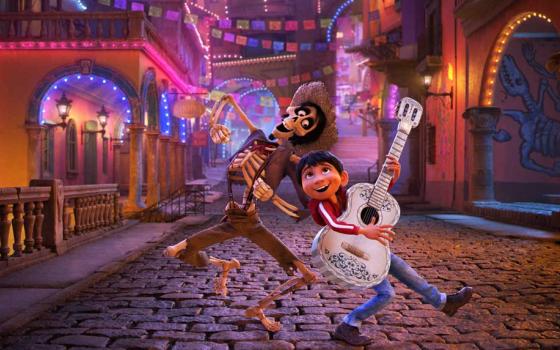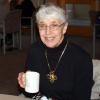The context for the 2018 Academy Award-winning Best Animated Feature Film "Coco," and for the Best Original Song "Remember Me", was the Día de los Muertos, ("Day of the Dead"), celebrated on Oct. 31 in Mexico and other countries with large Hispanic populations. The festive day keeps those who have died in the memory of the living, as the lyrics of the song, "Remember Me", so poignantly describes:
Remember me
Though I have to say goodbye
Remember me
Don't let it make you cry
For ever if I'm far away
I hold you in my heart
I sing a secret song to you
Each night we are apart. …
"Coco," after whom the film is named, is 12-year-old Miguel Rivera's great-grandmother. She was severely traumatized after her father, Miguel's great-great-grandfather, left his family, presumably to pursue a self-interested career in music.
Coco's father is now in the Land of the Dead, whose inhabitants still live in the memory of those who knew them. He is desperate for Coco to remember him — or else he will be truly dead — and for the family to learn the truth about his departure.
Miguel, whose musical talent is denied by the family, runs away on the Día de los Muertos and, in a fantasy plot, meets his great-great-grandfather in the Land of the Dead. Together they manage for Coco to remember her father's love for her, and for Miguel's family to honor his talent.
While I was watching the beauty and the artistry of this film unfold, the words the priest says at the consecration of the bread and wine in the Mass came back to me: This is my Body, this is my Blood, do this in remembrance of me.
Later I began to reflect on what it means to remember a loved one. Is it only the past that is recalled, a past that is colored by the perspective of the specific time in which the event took place? Or can memories be worked through, processed and integrated into present life with broader understanding?
My experience as a clinical psychologist and therapist is that the latter option is best.
For example, a client who is a member of a religious community and now 50 years old, tells me that she is still angry and holds a grudge against a major superior. That superior refused her request to remain in the same school and city in which her elderly and ill parents lived, and instead transferred her to a school and city a great distance away.
In order for her to heal, it was necessary not only for her to acknowledge her own anger and hurt, but also to try to understand what the superior might have been thinking and feeling. She also needed to become aware of how the refusal had, in fact, offered an unsuspected opportunity for personal growth.
It seems to me that Coco and her family learn something like this in the film: her father did not leave because of egotistical self-interest, and he intended to return. Miguel's great-great-grandfather's musical DNA is recognized as living on in his great-great-grandson, bringing joy and life for all who hear his music.
We Christians are memory keepers of Christ's incarnation, passion, death and resurrection.
In the order of the Mass, after the words of consecration, we respond: "We proclaim your death, O Lord and profess your resurrection, until you come again." The tradition of the church, over time, has helped us understand how we do this — that is, proclaim, make known to others the good news.
Without discounting tradition, is there a way, within the context of evolution and the "new" cosmology, to bring a broader perspective to this most sacred and central mystery of our faith?
Pierre Teilhard de Chardin — a French Jesuit, paleontologist, and mystic — thought there was. He wrote a prayer in which he asks God to grant "that when I draw near to the altar to communicate, I may henceforth discern the infinite perspectives hidden beneath the smallness and nearness of the Host in which you are concealed."
Teilhard wrote much about our cosmic relation to Christ. Following the words of John, "The Word became flesh and dwelt amongst us," he understood that, by reason of the incarnation, Christ has a cosmic body: that is, a body made up of the evolving "stuff" of the universe, just as we humans do.
In the Divine Milieu he takes Paul's words quite literally when Paul says, "You then are the body of Christ, every one of you is a member of it."
And he takes Paul literally that "all creation groans and is in agony until now;" Teilhard sees the cosmic body of Christ, of which we are members, as a birthing process.
If we as members are open and accepting of our Christian life, by what we do in Christ and what we suffer in Christ, we bring Christ to life in the present and in hope for the future.
Teilhard sums this all up by writing: "Owing to the interrelation between matter, soul, and Christ, we bring part of the being which he desires back to God, in whatever we do. With each one of our works, we labour – in individual separation, but no less really – to build the Pleroma; that is to say, we bring Christ a little fulfillment."
As Miguel's great-great-grandfather's DNA lives on in Miguel, so Christ's DNA lives on in us. We sing Christ's song of love and forgiveness to the world as an invitation not only to listen but to join in "until he comes again."
[Ruth Droege is a member of the Dominican Sisters of San Rafael, California, and holds doctorates in both theology and clinical psychology. Now retired, she co-leads the Teilhard Learning Circle at the Santa Sabina Center in San Rafael.]

